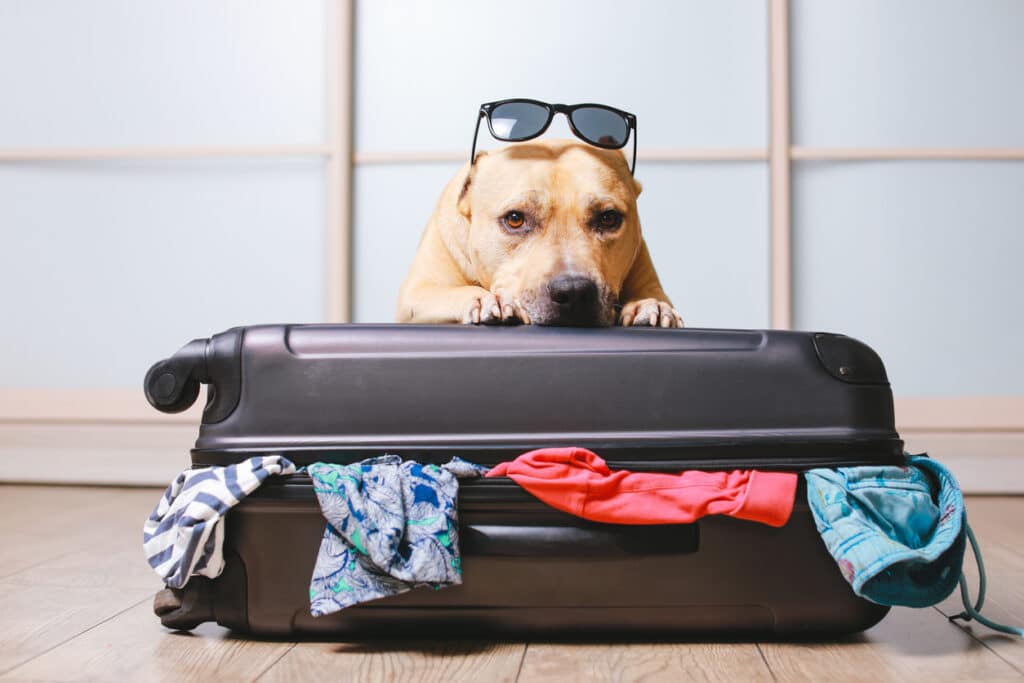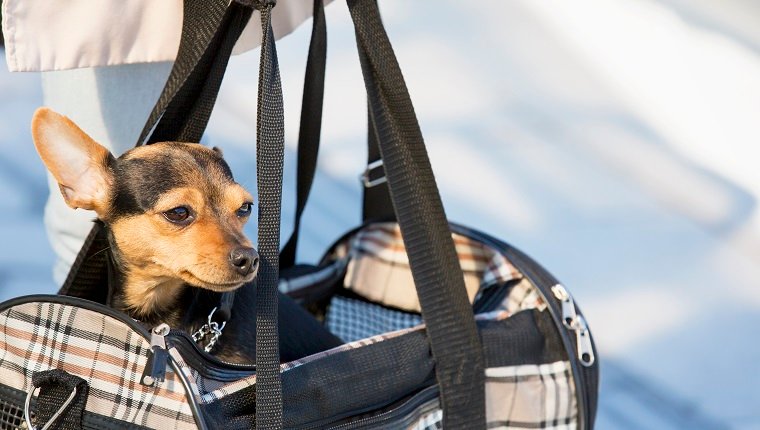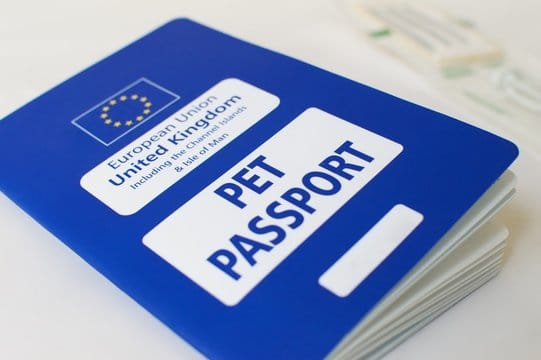Moving To The UK From Asia With A Dog part 1 – that will be the topic of today’s article.
Before introducing this article, if you are interested in our core services which are expat financial, insurance and mortgages, you can contact me here.
The best time to consider your financial situation is when you are moving to a new country.
Introduction
Your dog is your best friend, and the last thing you want to do is leave them behind when you move overseas. It’s always a stressful task looking for new accommodation and shipping many items, so how would you feel if you had to move and take your four-legged friend with you?

Moving your pet from Asia can be a tricky process as quarantine laws must be met and carried out. The easiest way around this is to send your canine companion via cargo as long as all conditions are met. If you choose to take the doggy plunge, here’s what you’ll need:
- A microchip (the smallest size that can hold a microchip number is fine)
- Vaccination certificates for rabies, distemper, hepatitis, and parvovirus
- Documentation that verifies you are the owner of the dog
- A government veterinarian issued an international health certificate. This must be done in the country where your pet resides after physical examination seven days before departure to receive an import permit from England.
- The veterinary health certificate will be valid for ten days after the issue date.
- A tapeworm test must also be carried out within one day before departure to Great Britain.
- Veterinarian appointment at a USDA-approved veterinarian in your country of residence and an APHIS form 9001 completed by a USDA accredited veterinarian.
- A certificate of acclimatization in the country of origin is required if your dog has not lived continuously in a rabies-free country for six months or more before the date of importation to Great Britain.
Interesting Things to Know When Moving With Your Dog

Moving from a country in Asia to the UK can be an exciting experience. You get to see many new places, and you will meet many new people from diverse cultures. However, there are some things that you need to keep in mind when moving from a country in Asia to the UK with a dog.
These include housing regulations, transportation, quarantine regulations, medical expenses, and vaccinations.
Housing Regulations in the UK
The housing regulations for dogs are different all around the world. Therefore you need to research before moving with your dog to the UK.
For example, certain breeds of dogs like Pitbulls or Japanese Tosa’s are banned, whereas other dogs like spaniels and retrievers are welcomed with open arms. Therefore, if you have a dog of a certain breed, it is best to stay in the country of origin until you get your immigration status sorted out.
Transportation from Asia to the UK
After getting an overview of housing regulations for dogs in the UK, you may want to research transportation. There are many options, and it is best to do some research before deciding what suits you and your dog the most.
Also, it is important to keep in mind that you will most likely need someone’s help when transporting your dog from Asia to the UK. There are much more options if you are based in big cities, whereas smaller locations might only offer airplanes or ferries as transportation possibilities.

Quarantine Regulations in the UK
The quarantine regulations for dogs vary worldwide, but they can be broken down into two main types: rules regarding pet passports and rules regarding rabies vaccinations. UK has strict pet passport regulations, which means that you must fulfill certain rules to take your dog to the UK with you.
If you are not aware of these rules, it is best to check them online or ask a veterinarian. However, if you fail to fulfill these requirements upon entry into the country, then your dog might be put down immediately after arriving in the UK.
Medical Expenses for Dogs in the UK
The regulations about having your dog vaccinated against rabies before entering the UK are also strict, and you need to check them online or ask a veterinarian. Your pet must receive an anti-rabies vaccine before entering the country because it will be greatly impeded if you fail to do so.
If you plan to import your dog to the UK, you should first make sure that all of their paperwork is in order. You can talk to a veterinarian about getting vaccinations for your pet against diseases like Canine Distemper, Infectious Canine Hepatitis, Parvovirus, and Distemper, or get a vet appointment to meet all of the requirements for entry into the UK.
The Cost of Importing a Dog from Asia to the UK
The cost of importing a dog from Asia to the UK varies greatly on many factors such as location, size, weight, and breed. On average, though, it will usually cost between 300 and 500 pounds.
You will also need to pay for additional things like transporting your dog safely, paying for their medical examinations, the vaccinations, the pet passport, as well as other costs that are related to importing a dog into the country.
Expenses after Moving from Asia to the UK
Besides the direct costs of moving from Asia to the UK with a dog, there are also additional indirect costs that you should keep in mind. These include food expenses, veterinary expenses, and grooming costs. There are many options for housing your dog during your stay in the country, as well as boarding kennels where you can leave your pet while traveling or even finding someone willing to pet sit your dog.
Trips after Moving from Asia to the UK
After you have moved from Asia with your dog, there are many exciting trips that you can go on with them! The UK has many exciting places for dogs like beaches and parks, perfect for enjoying some time outdoors while having fun.
There are also many dog-friendly restaurants, cafes, and pubs that you can visit with your canine. If you’re looking for more of an adventure, then there are also some great hiking trails that you can go on together.
Moving From Thailand with Dog to the U.K

Moving to the UK with a pet is not as difficult as you think. There are many similarities between the two countries, and there are certainly no barriers that should prevent you from relocating your pet to the United Kingdom.
For example, if your dog is already microchipped, this can be carried over, and there is an official format for microchipping in the UK. You may be thinking about how you are going to transport your pet to the UK and whether they would need any vaccinations before coming here.
This article aims to answer some of those common questions. Without further ado, below are the things to know before moving your dog from Thailand to the U.K.
Make Sure Your Dog is Microchipped
The UK has a system of transferring microchip data between member countries, so it is easy to bring your pet with you. The microchip must be implanted before the rabies vaccine, which means that there may be some delay for this particular formality if your dog was already living in Thailand.
Additionally, a new rabies vaccine will be required to ensure that the inoculation administered in Thailand is ineffective for a dog moving to the UK.
Vaccinations
In terms of vaccinations, no additional vaccinations are required before your pet can travel from Thailand to the UK as long as they have been vaccinated for rabies as per their Thai vaccination papers. However, a blood test will be required to check that the initial vaccination is effective.
Make Sure Your Pet Has a Pet Passport

If you plan to bring your four-legged friend with you on vacation or permanently, you must have a compliant pet passport from the country of origin. In this case, if your dog was already living in Thailand, they will need to obtain a pet passport from an approved government body like the Animal Quarantine Station (AQS).
Get a Veterinarian in the U.K
In order for you to bring your dog from Thailand to the UK, you will need a veterinary certificate from AQS stating that they have inspected your dog and that appropriate documentation is available for travel. The vet will also check that the microchip complies with the ISO standard 11784/11785. If your dog’s microchip is not compliant, a new one will need to be implanted.


